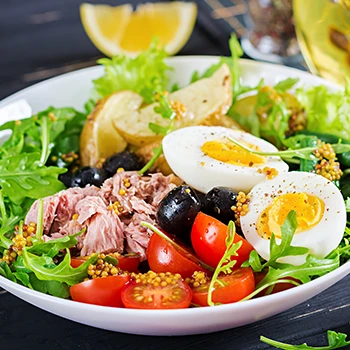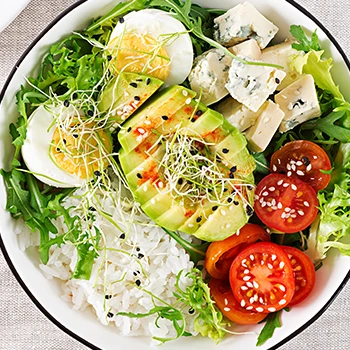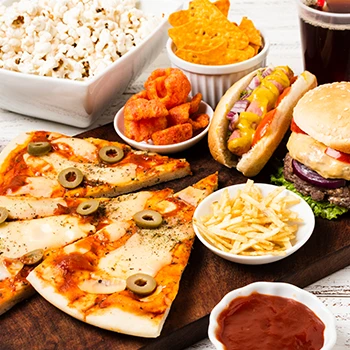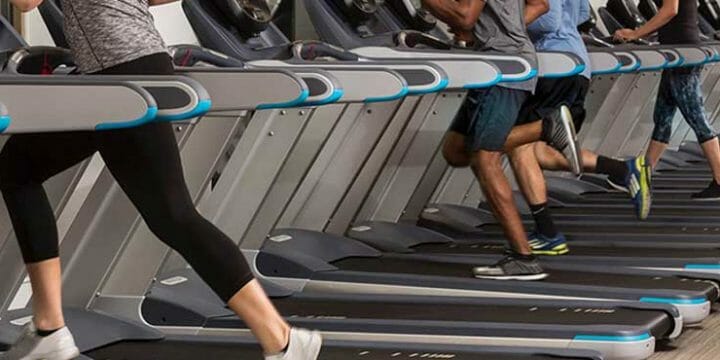Cardio workouts should be planned around balanced meals with appropriate protein, carbs, and fat.
But people often get confused about what exactly they should eat and when the best time is.
I collaborated with a sports nutritionist and dietitian to develop an athlete-focused nutrition plan based on scientific research.
Here’s what our research revealed.
Quick Summary
- To maximize performance in cardio workouts, consume foods rich in protein and complex carbohydrates, which provide sustained energy and muscle support.
- At a small, balanced pre-workout meal consisting of carbohydrates, proteins, and healthy fats to avoid discomfort and provide necessary workout fuel.
- Alongside solid food, staying well-hydrated before cardio is crucial, as proper hydration can enhance endurance and performance by up to 20%, significantly impacting workout effectiveness.
- In my experience, timing your pre-cardio meal correctly, ideally 45-60 minutes before exercise, is as crucial as the meal's content for optimal performance and energy levels.
What Food Should You Eat For Cardio?

You should eat foods that are rich in protein and complex carbs for cardio.
Complex carbs, when timed correctly, balance fuel needs and boost performance, as confirmed by the study published on the National Library of Medicine website [1]. More on that shortly.
The protein can then also help your muscles perform better, but it’s also a valuable macro to prepare for muscle recovery after your workout. From my training experience, I've noticed that clients who consume adequate protein before cardio not only perform better but also report less muscle soreness and quicker recovery times post-workout [2].
It shouldn't be a replacement for a post-workout shake, but it’s a good idea to stock up on amino acid supplements.
Here are four simple snacks that you can either buy ready to eat or make within just a few minutes.
- A small bowl of oatmeal topped with nuts and seeds for healthy fats
- Fruit smoothie with frozen berries and Greek yogurt for a protein boost
- Granola bar with coconut oil
- Whole wheat bread with almond butter and cottage cheese
You’ll see in these recommendations that there are some foods that contain sources of healthy fats.
The reason we don’t recommend loading up on fat is that it’s slow to digest, and you need the energy released for your exercise routine [3].
How Much Should You Eat For a Pre-Workout Meal?

You should only eat a small portion as a pre-workout meal.
Eat a small pre-workout meal to avoid discomfort during cardio workouts [4].
More on timing shortly.
What I recommend is eating up to 300 calories of food for this snack. It’s very much dependent on whether your goals are maintaining weight or bulking up fast.
And your overall physique, strength, and intensity of workouts could also increase or decrease that number.
But you want to avoid eating too much more than that as you may feel bloated during training.
Incorporating a balanced mix of carbohydrates, proteins, and fats in a pre-workout snack can effectively fuel your workout and enhance performance.
Opt for whole-grain toast, nut butter, healthy shakes, or nuts and fruits for sustained energy without discomfort.
Finding the proper pre-workout meal that works for you may require experimentation and individual customization.
Getting The Timing Right
What I would suggest is eating a small snack about 45 to 60 minutes before a cardio workout.
That should be long enough for your body to start the digestion processes and release the energy in the carbs and protein.
A small meal or smoothie is ideal for that 60-minute window before a workout [5].
Protein intake before training helps reduce muscle damage during recovery, additionally, consume easily digestible carbs for quick energy and avoid high-fiber or fatty foods pre-workout. Stay hydrated by drinking water with your snack.
What Shouldn’t You Eat Before Cardio?

You shouldn’t eat junk food or sugary treats before a cardio session.
This also includes a type of sports drink that is more likely to cause blood sugar spikes [6].
Keep in mind that this could make it difficult to burn fat while doing cardio exercises as there’s surplus energy available.
I’ve dealt with many clients who drank these sugary drinks before and during training, only to struggle with weight issues as a result.
“People who experience bigger dips in blood sugar report greater hunger and tend to eat more calories overall than people with smaller dips in blood sugar.“
- Lauren Bedosky, Writer at Everydayhealth.com.
And I also want to make sure we define junk food.
This isn’t just burgers, fries, and pizza. But it’s anything highly processed that includes lots of simple carbs and unhealthy fat [7].
It’s low in the nutrients you need for your muscles to perform and high in the “nutrients” that mess up your performance and health.
Avoiding unhealthy foods is crucial for all fitness goals and overall health, a healthy body weight is key for cardiovascular health and endurance in cardio exercises.
You can support your body's natural weight management processes by making conscious choices to avoid unhealthy, processed foods. You can also adopt a balanced diet rich in nutrient-dense options.
Regular physical activity and a nutritious diet are the keys to a healthy body weight. This leads to improved cardiovascular fitness and overall well-being.
FAQs
Is It OK To Do Cardio Right After Eating?
Yes, it is OK to do cardio after eating, but you need to give yourself some time. If you’ve had a large meal, then aim to wait at least two hours.
But for a small snack, it’s OK to start exercising your body about an hour later.
Can You Do Cardio After Breakfast?
Yes, you can do cardio after breakfast. Aim to eat a light breakfast of complex carbs and protein and reduce the amount of energy you get from fat.
That should make you feel less bloated during your workout.
References:
- https://pubmed.ncbi.nlm.nih.gov/32386289/
- https://www.ncbi.nlm.nih.gov/pmc/articles/PMC6142015/
- https://www.ncbi.nlm.nih.gov/books/NBK53550/
- https://health.clevelandclinic.org/what-to-eat-before-and-after-a-workout/
- https://blog.nasm.org/workout-and-nutrition-timing
- https://pubmed.ncbi.nlm.nih.gov/8936126/
- https://medical-dictionary.thefreedictionary.com/junk+food
About The Author
You May Also Like






